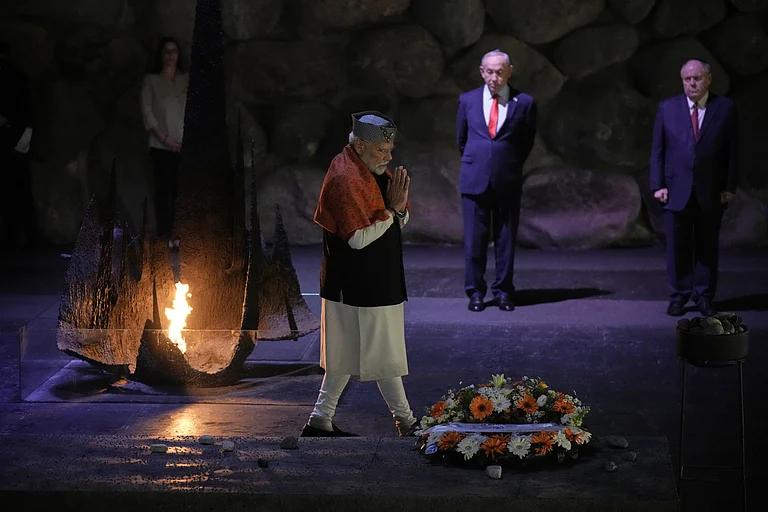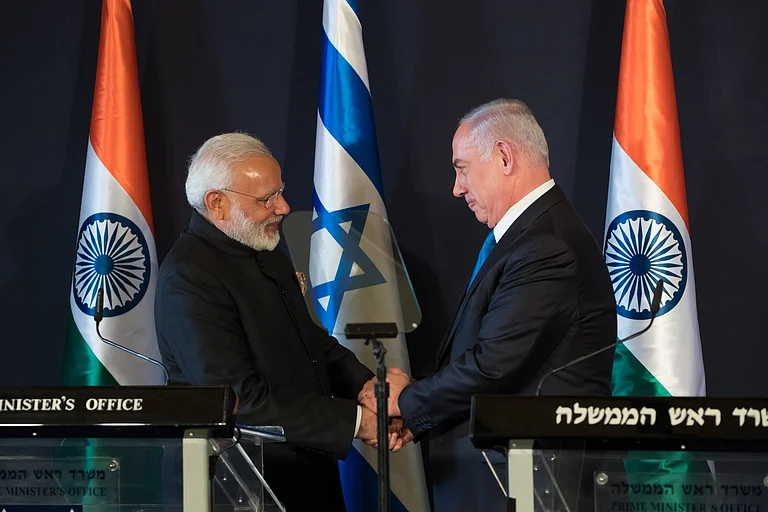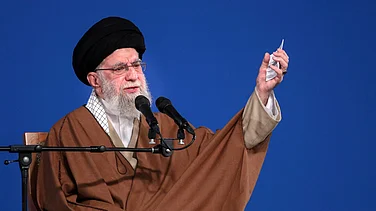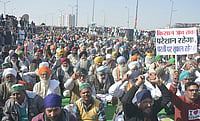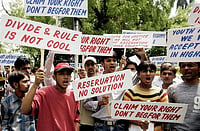Tens of thousands of Israelis gathered in cities across the country on Sunday night after Prime Minister Benjamin Netanyahu fired Defence Minister Yoav Gallant for calling to stop proposed judicial reforms.
Netanyahu's judicial reforms have divided Israel with months-long protests picking up pace lately. While Netanyahu and supporters of the reforms say the proposals would bring balance of power, the critics say it would weaken Judiciary and pave way for authoritarianism by making the Executive extremely powerful.
While Netanyahu's coalition is intact so far, there have been voices that say the proposals should be dropped. While Gallant was the most senior coalition figure to oppose the proposals, Culture Minister Micky Zohar has also said the party would support Netanyahu if he paused the passage of reforms.
The reforms are so contentious that even Israel's famed military and intelligence services —the most prestigious institutions in the country— are undergoing polarisation with several reports of personnel boycotting duties to participate in protests. Even those supporting the broader idea of legal reforms say the proposals go to far and some proposals need to be dropped.
Here we explain what Netanyahu's proposed judicial reforms contain, why these proposals have polarised Israel, and what the experts have said, and where things stand as of now.
What are Israeli judicial reforms?
Prime Minister Benjamin Netanyahu has proposed a set of laws that would overhaul the Israeli judicial system. Besides the contents of these laws, the pace at which these laws are being cruised through the Parliament has also come under criticism.
Netanyahu and overhaul's supporters say the proposals would bring balance of power to the government, but critics say it would weaken the Judiciary and would concentrate power in the hands of Executive.
The months-long protests are unprecedented in Israeli history. These protests are not just about the laws but also about Netanyahu, who is accused of safeguarding himself with the proposals. One of the proposals would mean that years-long corruption cases against him could be derailed.
In an article for Slate, Bradley Burston and Dahila Lithwick note that Netanyahu's reforms would bring following changes:
- Requirement of a super-majority of the Supreme Court —up to 80-100 per cent— to strike down any legislation
- Parliament could overturn Supreme Court judgement with simple majority in a Canadian style 'override' clause
- Israel's Basic Laws —equivalent of Constitution— immune from judicial review
- Give politicians more control of appointment of judges
- Amending corruption laws that address two of the three cases against Netanyahu
"The proposal would also grant immunity to prime ministers, ministers, and members of the Knesset 'for any crime they might commit in relation to their position while in office'. So that's awesome," noted the Slate article.
Why is Israeli judicial overhaul controversial?
The majority of Israelis are opposed to Prime Minister Benjamin Netanyahu's proposed judicial reforms, including up to the half of his own voters, according to a poll held last month.
The poll by the Israel Democracy Institute found that 66 per cent of Israelis believe the Judiciary should have the power to strike down laws, which is among the main features of the overhaul. The Times of Israel further reported that the poll found that among respondents who voted for Opposition parties, 87 per cent support the court’s power to review Basic Laws, and for those who voted for coalition parties, 44 per cent had such a view.
"Close to half —47 per cent— of respondents who voted for Netanyahu’s Likud party supported the court’s ability to oversee Basic Laws...The survey found that 63% of Israelis think the Judicial Selection Committee should maintain its balance between justices and politicians, who must reach agreement on judicial appointments. The government’s proposed legislation would give politicians control over the committee," reported ToI.
Critics have also highlighted that the overhaul would result in a weakened Judiciary and powerful Executive. They highlight that Israel does not have a proper separation of powers that could isolate Judiciary or Executive or Legislature from each other. They futher point out that Israel does not have a system of checks and balances on Executives like some other countries from where drafters of the overhaul appear to be taking inspiration for the overhaul.
Notably, Israel does not have a Constitution. A set of laws called Basic Laws are the equivalent of the Constitution.
In their article for Slate, Burston and Lithwick note that drafters of the overhaul are going ahead despite Israel having:
- No bicameral Legislature that could add more dialogue to policymaking and balance power among parties
- No US-style federalism where powers are divided carefully between states and federal government
- No separation between Legislature and Executive as Executive is drawn from Legislature
- No charter of rights like Canada despite borrowing Canada's 'override' clause
- No formal Constitution
Dan Arbell of Washington DC-based American University highlights that it's said the overhaul undermines features that have defined Israel its founding.
"The plan calls for near total control over future laws, constitutional amendments and judicial appointments to be concentrated in the hands of the governing coalition in the Knesset. Critics and protesters say the plan undermines the 75-year delicate balance between the three government branches, ends liberal democracy as they know it and pushes Israel towards autocratic rule," writes Arbell in an article for The Conversation.
Besides social polarisation, the overhaul could also adversely affect the Israeli military and intelligence which have been drawn into the protests in an unprecedented manner. These services are highly respected inside Israel and are famed across the world for their prowess and daring missions.
Arbell notes, "As the country inches closer towards a constitutional showdown between the executive and legislative branches and the judicial branch, the presence of former members of elite military units in these protests is evidence that the crisis’ implications extend far beyond the domestic political arena. Besides threatening to undermine the economy and deepen societal divides, it threatens to erode Israeli national security and provoke a constitutional crisis that could ensnare the military as well."
Supporters of a compromise
Moderate supporters of Prime Minister Bejamin Netanyahu or the reforms have said that reforms are definitely required but the current proposals go to far and need to be watered down. They say the government needs to negotiate with the protesters and Opposition to arrive at a compromise.
Moshe Koppel of pro-reforms Kohelet Policy Forum has also encouraged Netanyahu-led ruling coalition to drop the override provision that would allow the Parliament to overrule Supreme Court decisions, "considering the understandable fear that such an override could be abused and the danger that it would contribute to escalating tension between the branches", according to the Council on Foreign Relations (CFR).
The CFR further cites former minister Natan Sharansky as saying that both the sides are wrong and need to arrive at a common solution.
The CFR notes, "He supports some of the reforms, such as the one on judicial selection ('The fact that judges are deciding who will be the next judge,' he says, 'is something absolutely unacceptable.') but not others, and criticises both the governing coalition and the opposition for their failure to sit down and negotiate a compromise."
Where things stand in Israel now?
Tens of thousands of Israelis poured into the streets of cities across the country on Sunday night in a spontaneous outburst of anger after Prime Minister Benjamin Netanyahu abruptly fired Defense Minister Yoav Gallant who asked the overhaul to be halted.
Protesters in Tel Aviv blocked a main highway and lit large bonfires, while police scuffled with protesters who gathered outside Netanyahu's private home in Jerusalem.
Gallant had been the first senior member of the ruling Likud Party to speak out against it, saying the deep divisions were threatening to weaken the military. But as droves of protesters flooded the streets late into the night, Likud ministers began indicating willingness to hit the brakes. Culture Minister Micky Zohar, a Netanyahu confidant, said the party would support him if he decided to pause the judicial overhaul.
Israeli media said leaders in Netanyahu's coalition were to meet on Monday morning.
Later in the day, the grassroots protest movement said it would hold another mass demonstration outside the Knesset, or parliament, in Jerusalem.
Demonstrations took place in Beersheba, Haifa and Jerusalem, where thousands of people gathered outside Netanyahu's private residence.
Police scuffled with protesters and sprayed the crowd with a water cannon. Thousands then marched from the residence to the Knesset.
Leaders of Israel's vibrant high-tech industry have said the changes will scare away investors, former top security officials have spoken out against the plan and key allies, including the United States and Germany, have voiced concerns.
In recent weeks, discontent has surged from within Israel's army — the most popular and respected institution among Israel's Jewish majority. A growing number of Israeli reservists, including fighter pilots, have threatened to withdraw from voluntary duty if the laws are passed.
Israel's military is facing an increase in fighting in the occupied West Bank, threats from Lebanon's Hezbollah militant group and concerns that archenemy Iran is close to developing a nuclear-weapons capability.
Manuel Trajtenberg, head of an influential Israeli think tank, the Institute for National Security Studies, said that "Netanyahu can dismiss his defense minister, he cannot dismiss the warnings he heard from Gallant".
(With AP inputs)








